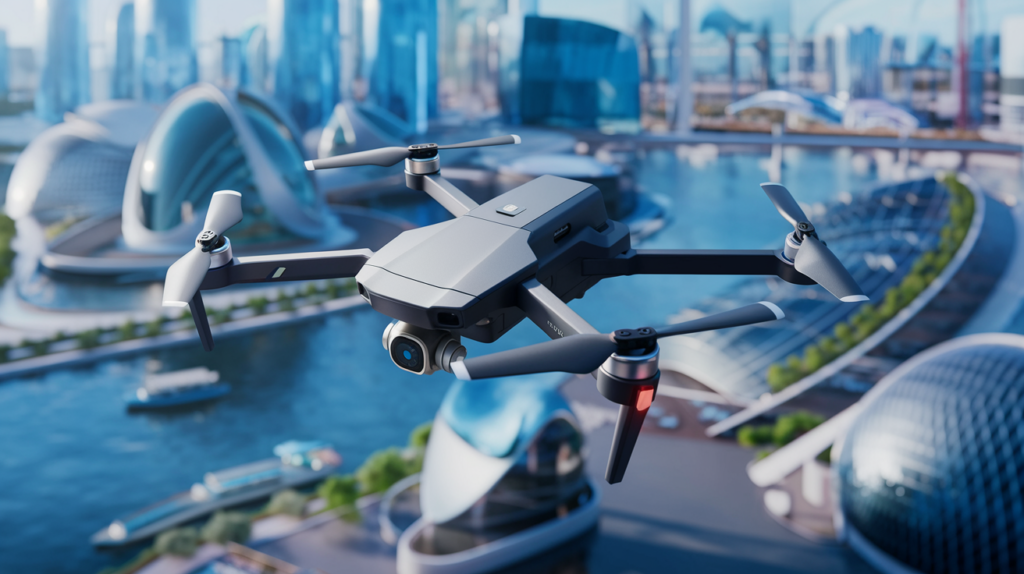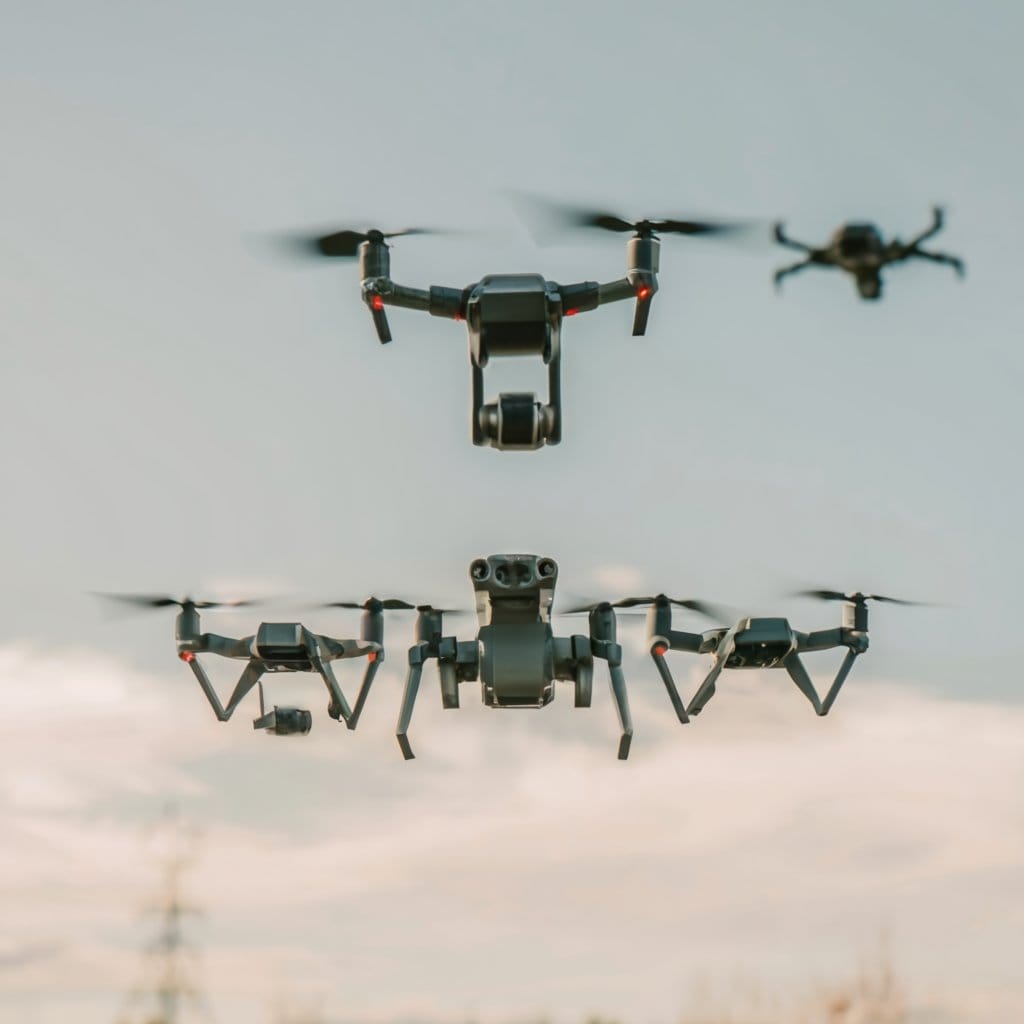The world of drones has exploded in recent years, and for newcomers, the sheer variety can be overwhelming. If you’re looking for an entry point into this exciting hobby, mini drones are an excellent choice. They’re portable, affordable, and easy to fly, making them perfect for beginners. This guide will walk you through everything you need to know to choose the best mini drone for your needs out of the best Mini Drones for beginners.

What is a Mini Drone?
Before we dive into specific models, let’s define what constitutes a “mini drone.” Generally, mini drones are characterized by their small size and lightweight design, often weighing less than 250 grams (8.8 ounces). This classification is significant because, in many countries, including the United States, drones under 250 grams are exempt from certain regulations, such as mandatory registration with aviation authorities. This makes them particularly appealing to beginners who want to avoid additional paperwork and legal complexities.
However, despite their small size, mini drones are increasingly capable, offering features like:
- High-resolution cameras for capturing photos and videos (think: “best mini drone for aerial photography beginners”)
- Stable flight performance with GPS and other stabilization systems (consider: “mini drone with GPS for stable flight”)
- Intelligent flight modes for automated maneuvers (“easy to use mini drone with intelligent flight modes”)
- Reasonable flight times (“long flight time mini drone for beginners”)
- Good durability (“durable mini drone for beginner pilots”)
Best Overall Mini Drones
When it comes to the top mini drones, several models consistently stand out. These drones offer a great balance of features, performance, and value, making them ideal for beginners who want a high-quality experience without breaking the bank. Factors like camera quality, flight stability, and intelligent flight modes contribute to their top ranking.
- DJI Mini 4 Pro: The DJI Mini 4 Pro is often cited as the best overall mini drone for beginners. It boasts a high-quality camera capable of capturing stunning 4K video (and even higher resolutions in some configurations), excellent flight stability, and a comprehensive suite of intelligent flight modes. Its lightweight design (under 249g) means it doesn’t require registration in many regions. This makes it a top choice for those seeking the “best camera mini drone for beginners” and a “lightweight mini drone for travel.”
- Key features often include:
- 4K video recording (or higher) for crystal-clear footage (“high-resolution video mini drone”)
- Excellent image stabilization for smooth aerial shots (“mini drone with best image stabilization”)
- GPS for precise positioning and reliable return-to-home (“mini drone with GPS and return to home”)
- Obstacle avoidance for safer flights, especially for new pilots (“mini drone with obstacle avoidance for beginners”)
- Intelligent flight modes (e.g., QuickShots, ActiveTrack) for capturing professional-looking videos with ease (“mini drone with QuickShots for beginners”)
- Long flight time for extended enjoyment (“long flight time mini drone for aerial photography”)
- Autel Robotics EVO Nano+: The Autel EVO Nano+ is another strong contender, offering a compelling alternative to DJI. It’s known for its exceptional camera performance, particularly in low-light conditions (“best low light mini drone”), and robust build quality. It also incorporates obstacle avoidance, a feature not always found in mini drones, making it a safe choice for those looking for a “mini drone with collision avoidance.”
Best Budget Mini Drones
For those just starting out, cost is often a primary concern. Fortunately, there are many excellent mini drones available at budget-friendly prices. These drones may have fewer advanced features, but they still provide a fun and rewarding flying experience. We’ll explore some of the best options that deliver great value without compromising on essential features.
- DJI Mini 3: The DJI Mini 3 is a more budget-friendly option from DJI, offering a good balance of essential features and affordability. It still captures high-quality video and benefits from DJI’s renowned flight stability. It’s a great choice for those seeking an “affordable mini drone for beginners” that still delivers good performance.
- Potensic Atom: The Potensic Atom is another budget-friendly drone that provides good value for beginners. It offers a decent camera, stable flight performance, and a user-friendly design. Consider this if you’re looking for a “cheap mini drone for beginners” with decent features.
Key Features to Look For
Before you make a purchase, it’s crucial to understand the key features that differentiate mini drones. Here’s what to consider:
- Flight Time: Longer flight times mean more time in the air and less time spent swapping batteries. Look for drones with a decent flight time (typically 20-30 minutes or more) to maximize your enjoyment. When evaluating flight time, consider how it’s affected by factors like wind conditions (“mini drone for windy conditions”) and flight mode (e.g., sport mode consumes more power).
- Camera Quality: If you’re interested in aerial photography or videography, camera quality is essential. Consider resolution (4K is becoming standard, but some offer higher resolutions), image stabilization (a gimbal is crucial for smooth footage – look for a “mini drone with 3-axis gimbal”), sensor size (larger sensors generally perform better in low light – consider a “mini drone with large image sensor”), and video frame rates (higher frame rates allow for smoother video and slow-motion capabilities – a “mini drone for slow motion video”).
- Ease of Use: Beginner-friendly drones should be easy to control, with intuitive controls and helpful features like:
- Auto-takeoff/landing: Simplifies the initial and final stages of flight (“mini drone with auto takeoff and landing”).
- Return-to-home (RTH): Automatically returns the drone to its takeoff point if the battery is low or the signal is lost (“mini drone with reliable return to home”).
- GPS stabilization: Helps the drone hover in place and resist wind (“mini drone with GPS stabilization”).
- Intelligent flight modes: Automated flight modes like QuickShots (pre-programmed cinematic maneuvers) can help beginners capture professional-looking footage (“mini drone with beginner-friendly flight modes”).
- Portability: One of the biggest advantages of mini drones is their portability. Look for models that are compact and easy to transport. Folding designs are particularly convenient (“best portable mini drone for travel”).
- Durability: Accidents happen, especially when you’re learning to fly. Choose a durable drone that can withstand minor crashes. Consider the build quality of the drone and the availability of replacement parts (“durable mini drone for beginners”).
- Safety Features: Safety is paramount, especially for beginners. Look for features like:
- Obstacle avoidance: Sensors that detect and help the drone avoid obstacles (trees, buildings, etc.). This is a crucial feature for beginners (“mini drone with obstacle avoidance for safe flight”).
- Return-to-home (RTH): As mentioned earlier, this feature automatically returns the drone to its takeoff point in case of signal loss or low battery (“mini drone with automatic return to home”).
- GPS: Helps stabilize the drone and enables features like RTH (“mini drone with GPS”).
- Geofencing: Allows you to set virtual boundaries to prevent the drone from flying into restricted areas (“mini drone with geofencing”).
Top Mini Drone Models
Here are some of the standout mini drone models on the market:
- DJI Mini Series: DJI has long been a leader in the drone industry, and their Mini series is particularly well-suited for beginners. These drones are known for their impressive camera quality, stability, and ease of use. Models like the DJI Mini 3 and Mini 4 Pro offer excellent features in a compact package. For those seeking the “best beginner drone under 250g,” the DJI Mini series is a strong contender.
- DJI Mini 3: A great entry-level option that doesn’t skimp on essential features. A good choice for those seeking a “cheap beginner drone with good camera.”
- Pros: Compact and lightweight (“lightweight beginner drone”), good image quality, affordable (“affordable mini drone for new pilots”).
- Cons: No obstacle avoidance.
- DJI Mini 4 Pro: A more advanced mini drone with a superior camera and obstacle avoidance. Consider this the “best mini drone for beginners with obstacle avoidance.”
- Pros: Excellent camera (“best camera quality mini drone”), obstacle avoidance (“mini drone with front and rear obstacle avoidance”), intelligent flight modes.
- Cons: More expensive (“premium mini drone for beginners”).
- Autel EVO Nano Series: Autel Robotics offers compelling alternatives to DJI, and their EVO Nano series is worth considering. These drones often boast impressive camera specs and advanced features. If you’re looking for a “compact drone with advanced features,” this is a good place to start.
- Autel EVO Nano+: Known for its exceptional camera and robust build. A strong contender for “best alternative to DJI mini drone.”
- Pros: High-quality camera (“mini drone with exceptional image quality”), obstacle avoidance (“mini drone with three way obstacle avoidance”).
- Cons: Can be more expensive than some competitors.
- Other Notable Mini Drones: In addition to DJI and Autel, several other manufacturers offer excellent mini drones. We’ll explore some of these other notable models, highlighting their unique features and strengths.
- Ryze Tello: A very affordable and lightweight drone, good for very beginners and children. Great for learning “how to fly a mini drone for the first time”.
- Pros: Very affordable (“most affordable mini drone”), easy to fly (“easiest mini drone to fly”).
- Cons: Limited range, basic camera (“basic camera drone for beginners”).
- Holy Stone HS Series: Holy Stone offers a range of beginner-friendly drones with various features and price points. Good for finding a “beginner drone with long battery life” at a reasonable price.
Considerations for Beginner Drone Pilots
Before you take to the skies, there are a few essential considerations for beginner drone pilots:
- Regulations and Registration: Drone regulations vary by location, so it’s crucial to familiarize yourself with the rules in your area. In many places, drones above a certain weight (often 250g) must be registered with aviation authorities. It’s important to understand the “drone laws for beginners” in your specific location.
- Research your local aviation authority’s website (e.g., the FAA in the United States, the CAA in the United Kingdom) for the most up-to-date regulations. Look for information on “drone registration requirements” and “flying a drone for the first time legally.”
- Be aware of restricted airspace, such as near airports, military bases, and government buildings. Understand the rules about “flying drones near airports” and other restricted zones.
- Understand the rules regarding privacy and filming in public areas. Beginners should be aware of “drone privacy laws” and “rules for flying drones in public.”
- Learning Resources: Take advantage of the many available learning resources, such as:
- Online tutorials: YouTube is a great source of “drone flying tutorials for beginners.”
- Flight simulators: Practice flying in a virtual environment before taking to the skies with your actual drone. This is a great way to “learn to fly a drone without crashing.”
- Drone pilot courses: Consider taking a formal course to learn advanced flying techniques and safety procedures. Look for “beginner drone pilot training.”
- Manufacturer’s instructions: Always read the manual that comes with your drone. This is the first step in “learning to fly your new drone.”
- Accessories: Consider investing in essential accessories, such as:
- Extra batteries: Extend your flying time (“best accessories for extending drone flight time”).
- Propeller guards: Protect the propellers from damage, especially during initial flights (“essential drone accessories for beginners”).
- Carrying case: Protect your drone during transport (“best way to transport your mini drone”).
- Landing pad: Provides a clean and level surface for takeoff and landing (“best landing pad for mini drones”).
Mini Drones for Specific Purposes
Mini drones are versatile and can be used for a variety of purposes:
- Photography: Many mini drones are equipped with high-quality cameras, making them ideal for aerial photography. Capture stunning landscapes, cityscapes, and unique perspectives. When choosing a drone for photography, consider factors like “best mini drone for aerial photography,” “high resolution mini drone photography,” and “mini drone with image stabilization for photography.”
- Travel: The portability of mini drones makes them perfect for travel. Document your adventures and capture breathtaking footage from around the world. Look for drones that are “compact and lightweight for travel,” the “best travel drone for beginners,” and a “portable drone for backpacking.”
- Kids: There are also mini drones specifically designed for kids. These drones are typically lightweight, durable, and easy to fly, with added safety features like propeller guards and simplified controls. When choosing a drone for children, consider factors like “safest mini drone for kids,” “most durable drone for children,” and “easy to fly drone for kids.”
By considering these factors and exploring the available options, you can find the perfect mini drone to embark on your aerial adventure. Whether you’re a budding photographer, a travel enthusiast, or simply looking for a fun new hobby, there’s a mini drone out there for you.



